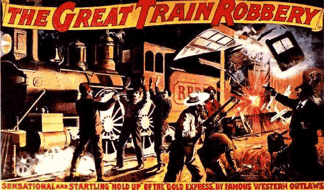The Great Train Robbery and Impoverished Writers

Will you entertain Dead Beat just a fraction more? I know it is asking a lot. But read on, and old D.B. begs you to think, really think about what follows. come on all ye poets working in a series of images or all you fiction writers working in scenes!
One of the milestones in film history was the first narrative film, The Great Train Robbery (1903), directed and photographed by Edwin S. Porter. The film used a number of innovative techniques, many of them for the first time, including parallel editing, minor camera movement, location shooting and less stage-bound camera placement. Jump-cuts or cross-cuts were a new, sophisticated editing technique, showing two separate lines of action or events happening continuously at identical times but in different places. The film is intercut from the bandits beating up the telegraph operator (scene one) to the operator's daughter discovering her father (scene ten), to the operator's recruitment of a dance hall posse (scene eleven), to the bandits being pursued (scene twelve), and splitting up the booty and having a final shoot-out (scene thirteen). The film also employed the first pan shots (in scenes eight and nine), and the use of an ellipsis (in scene eleven). Rather than follow the telegraph operator to the dance, the film cut directly to the dance where the telegraph operator enters. It was also the first film in which gunshots forced someone to dance (in scene eleven) - an oft-repeated, cliched action in many westerns. And the spectacle of the fireman (replaced by a dummy with a jump cut in scene four) being thrown off the moving train was a first in screen history.
In the film's fourteen scenes, a narrative story with multiple plot lines was told - with elements that were copied repeatedly afterwards by future westerns.
And, hey, D.B. knows how poor writers are in general - so please don't rob the banks, just tell us the way it was done.










No comments:
Post a Comment